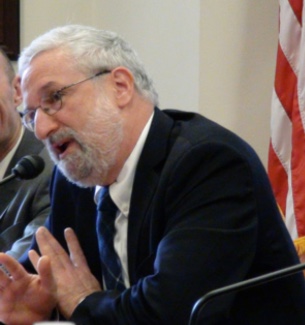What I’m Reading Now: Jim Grossman (Interview)

Why
did you choose history as your career?
I
started reading history very young, with biographies and fiction.
It never occurred to me that history could be a "career"
until I was in college and thought being a college professor seemed
like an interesting life. I loved reading history and I thought
it was important, so graduate school in history seemed like a good
thing to try.
What was your favorite historic site trip? Why?
I
don't think I could specify one. There are so many. The
WWII/siege sites in St Petersburg are fascinating and tell a story
that too few Americans know; Montpelier, Monticello, and Ashlawn
Highland one after another offer great comparisons and provoke
thoughts about how to memorialize national heroes who owned other
humans; Lowell National Historical Park is riveting. My guess
is that my all-time favorite might well end up being something I
haven't seen yet. One issue involved in evaluation is the
importance of the site itself as opposed to how well it has been
done.
If you could have dinner with any three historians (dead or alive),
who would you choose and why?
The
AHA has nearly 14,000 members. No way I'm going to single out
three. So I'll stick to the deceased: DuBois, Hofstadter, E.P.
Thompson
What books are you reading now?
Lisa
Tetrault, The
Myth of Seneca Falls;
Mark Carnes, Minds
on Fire.
What is your favorite history book?
Can't
imagine singling one out.
What is your favorite library and bookstore when looking for history
books?
I'll
go into just about any used bookstore. Or new bookstore.
I can't imagine having a favorite library. They are all
different, and have different purposes. I worked at the
Newberry Library for two decades and so have a special appreciation
for it.
Do you own any rare history or collectible books? Do you collect
artifacts related to history?
It's
hard to be a student of Leon Litwack and not acquire at least a few
relatively rare books over the years. But I don't have anything
truly extraordinary. "Collectible" is an
imprecise term, because anything can be "collectible" if
that's what suits your obsession.
Which history museums are your favorites?
There
are too many good ones to have a favorite. I have spent a lot
of time at the Chicago History Museum and the New-York Historical
Society. The National Museum of American History has embarked
on some exciting new initiatives. But I recently saw one of the
best history exhibitions I've ever experienced at the Victoria &
Albert in London, "Disobedient Objects." It's
still there.
Which historical time period is your favorite?
1952-Present
What would be your advice for history majors looking to make history
as a career?
Focus
on the relationship between historical thinking and the specific
things that fascinate you. Think as much about what you like
to do as
where you want to work. And look at the AHA's "Discipline
Core” document.
Who was you favorite history teacher?
I've
been very fortunate to have had so many good teachers beginning with
Dan Smith in 8th grade and Joan Barist in high school; Gerd Korman,
Michael Kammen, Richard Polenberg, and Walter LaFeber in college are
collectively responsible for my decision to go to graduate school,
along with a TA named Mark whose last name I cannot recall but who
seemed to love what he was doing; and then Paula Fass, Jim
Kettner, and Leon Litwack in graduate school. I am
grateful to all of them as well as those who have been my teachers
ever since, such as Roy Ritchie and Kathy Conzen, who taught me
what it means to be a member of a university faculty. Laura
Edwards and Peggy McCracken at the Newberry introduced me to a
literature that I should have been reading but wasn't. Dick
Brown and Stan Katz taught me how a historian can contribute to
scholarship and public culture without a university or college
appointment. One reason I love my current job is that I
continue to meet colleagues - mostly younger - from whom I continue
to learn.
Why is it essential to save history and libraries?
Historical
thinking is essential to just about everything we consider in our
civic lives and careers. Context always matters. People
need to understand how change happens. Libraries, print and
digital, are the resources that we need to continue to learn.
Beginning with the Greenburgh Public Library, I have spent much of my
life walking along narrow pathways, pulling books off of shelves,
sometimes only glancing at a few paragraphs, sometimes taking the
book over to a chair or taking it home. We can now do this
online as well, although in different ways. We need to save
libraries; we don't need to "save history."
“History" exists
whether we like it or not. Perhaps what we need to "save,"
is historical thinking, historical learning, and an appreciation for
the artifacts of the past.
